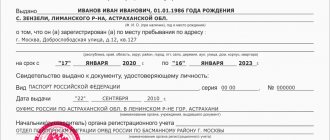After the liquidation of the Soviet institution of registration in 1993, improved standards for registering citizens were introduced that meet the needs of new times. Non-privatized premises were a common occurrence in the post-Soviet space. Nowadays, this legal status of real estate also sometimes occurs.
The housing stock has already been almost completely privatized, but it should be taken into account that there is also municipal property. The legal status of non-privatized housing is closely related to the registration of citizens in it.
Dear readers! The article talks about typical ways to resolve legal issues, but each case is individual. If you want to find out how to solve your particular problem , contact a consultant:
8 (800) 700 95 53
APPLICATIONS AND CALLS ARE ACCEPTED 24/7 and 7 days a week.
It's fast and FREE !
Questions about registration of place of residence and stay in such premises arise quite often. They are fully regulated by law and have their own nuances.
Registration in a non-privatized apartment is, of course, feasible. There are also some legal loopholes, knowing which can make the process easier.
Instead of registration in the Federal Law “On the right of citizens of the Russian Federation to freedom of movement, choice of place of stay and residence within the Russian Federation,” new terms have been introduced: registration at the place of residence or temporary stay.
The legacy of Soviet times was a large number of non-privatized (municipal) apartments. Now their number has been reduced to zero, but citizens still often need to register in municipal housing (dormitories, communal apartments, etc.).
In official documents and in jurisprudence, the term “registration” is not used, since the very norms it denotes have been eliminated. The concept of “violation of passport regime” has also sunk into oblivion.
But the word “registration” is still used among the people. It is convenient to use to briefly denote new concepts. If this word appears (including in this article), then it means new legal relations that have replaced Soviet norms.
Registration has been replaced by registration accounting, which regulates two options for registration: permanent and temporary at the place of residence. A citizen can have them at the same time. The powers of accounting, its organization and control are vested in the Federal Migration Service. This is where citizens should contact for all questions related to registration.
Registration functions are also performed by the administration of hotels, tourist centers, sanatoriums and similar institutions.
The basic registration rules for 2020 are as follows. The law establishes for those arriving for more than 90 days to stay for a while in housing that is not their place of residence, the obligation after the expiration of these days to register with the Federal Migration Service. This is an accounting of non-permanent residence of citizens.
The next type is registration at the place of residence, that is, permanent registration. Residents who change their permanent address must register within 7 days of arriving at their new location.
A newborn child is registered with one of the parents within 7 days after receiving birth certificates. Minors under 14 years of age are also registered with only one of their parents or guardians. For violations of the procedure, fines range from 2,500 to 7,000 rubles .
Above are the general registration rules, which must also be observed if registration is carried out in a non-privatized apartment. We will consider the specifics of registration in such housing in more detail below.
Temporary registration is often used to get a job, receive social security, or to assign a child to the right school or kindergarten. It is issued by the owner of the apartment and does not give the citizen any rights to housing, regardless of the form of ownership.
Things are somewhat different with permanent registration. In this aspect, if the apartment is not privatized, many opportunities open up for the citizen to acquire some rights regarding this housing.
Is it possible
To answer the question of whether it is possible to register a citizen in a municipal apartment, let us turn to the Housing Code of the Russian Federation.
Social hiring is discussed in Chapter 8 of the Housing Code of the Russian Federation. It contains the main provisions regulating the procedure for providing municipal apartments, the rules of living in them, the rights and obligations of the tenant, etc.
In Art. 70 determines the employer’s ability to register certain citizens in the premises he occupies.
Thus, according to the law, an employer can register other citizens only if they obtain consent from:
- family members, including those temporarily absent;
- landlord (in some cases).
Important! To register the tenant’s spouse, children and parents in municipal housing, you need permission from his family members (including those temporarily absent).
If registration is planned for other citizens (not related to the employer), in other words, outsiders, consent is required:
- from family members of the employer;
- as well as from the lessor, that is, the local administration body.
How are residents registered in the owner’s privatized apartment?
When registering, a rental agreement between the owner and the tenant may be required. It indicates the length of stay and payment for the use of the space. If the temporary registration of a tenant staying in the area under this agreement for 90 days or more is not formalized, then the owner of the premises will face an administrative fine , the amount of which can be very significant: from 100 to 500 thousand rubles. There is an exception. If citizens live without registration, but are registered in the same region or are a relative of the owner, then he will not be held accountable.
The owner personally applies to the passport office with an identity card and a certificate for the apartment. Writes an application for permission to register in his area. If there are several owners, everyone must be present and give permission. The procedure is the same for both permanent and temporary registration. But in the first case, the presence of the owner is not necessary, although it is possible.
Legal basis
The legal basis for registration of citizens is given in the following regulations:
- Government Decree No. 713;
- Law No. 5242-1;
- Housing complex of the Russian Federation;
- Administrative regulations for the provision by migration service bodies of state services for registration of citizens of the Russian Federation.
How to register ownership of land under an apartment building, how to register ownership of land under an apartment building. The resumption of apartment privatization is discussed on this page.
Registration procedure
Registration at the place of residence consists of the following stages.
Stage 1
The first step in the registration procedure will be to determine the category of citizen who wishes to register.
So, if the citizen is a relative of the tenant, for example, a spouse or child, the process will be simpler, because consent to move in will only have to be obtained from other members of the tenant’s family who are already registered in the living space.
If the person is not related to the employer, then, in addition to consent from the family members of the employer, they will also have to obtain written permission from the municipal authority.
Important! Permission to move in is given only by adults who are already registered in a municipal apartment.
Most often, obstacles to moving in arise precisely at the stage of obtaining permission from interested parties. And if the municipality can refuse, for the most part, on one basis, then the tenant’s family members are not required to justify their refusal.
Important! Registration in a municipal apartment gives the right to a share in future privatization. It is this factor that can serve as a determining factor in the refusal of other persons to issue a registration permit.
The landlord may also refuse to register another citizen (not a relative of the tenant) without giving reasons.
However, the primary basis for refusal will be the discrepancy between the established norm of area per person and the actual one (if this fact is revealed after the new citizen moves in).
Stage 2
After receiving all necessary permissions from interested parties, the procedure for collecting remaining documents follows. Their list is given below.
Stage 3
After collecting the documentation, you should contact the registration authority - the territorial department of the migration service.
Persons responsible for accepting documents are required to accept papers from the applicant and review them within the established time frame.
Important! Clause 17 of Resolution No. 713 regulates that when submitting an application for registration and other documents directly to the FMS, registration of a citizen is carried out within 3 days.
When carrying out the procedure through the Unified Portal of State Services or in a multifunctional center, the time frame may increase.
The applicant should provide a complete set of documents, including their copies. The migration service employee will check the originals with photocopies and return the originals (except for the passport).
The result of the provision of public services will be the issuance to the applicant, after a 3-day period from the date of submission of documents, of a passport with a mark indicating the new registration address.
Note! The entire package of documentation required for registration of a citizen must be submitted in the presence of all members of the employer's family, except for minor children.
Rejection reason
The main reason for refusal of registration is the discrepancy between the accounting standards for living space per person. In the regions it averages 18 m per person.
The rules on accounting housing standards do not apply when registering children.
The refusal cannot be motivated by the need to pay a fine (2-5 thousand rubles) for lack of registration.
Registration in a municipal apartment is possible in strict accordance with housing and migration legislation.
It is important for a citizen to find suitable housing and, if necessary, obtain the consent of the other residents for registration.
Documentation
To register, the moving-in citizen must provide the following documents, based on clause 16 of Resolution No. 713:
- identification document;
- application in the prescribed form for permanent registration;
- document-basis for moving into the specified residential premises;
- consent of interested parties.
The application is written by the citizen in accordance with Form No. 6 established by law. It is signed by both the employer and the person being registered.
you can here.
Blank forms for all required applications are also issued upon request by migration service employees. In addition, samples are also presented at the information stands of the government agency.
The law makes a separate provision regarding the basis document for moving in. Thus, a citizen may not provide such a document if information about it is already at the disposal of municipal or state authorities.
Since when moving into a municipal apartment, the social tenancy agreement is a fundamental document, it is advisable, but not necessary, to provide it. The state structure, in the order of interdepartmental interaction, will request all the necessary information from the local government body.
Registration process
Registration procedure for non-privatized housing:
| Obtaining written permission from the owner of the premises | will be required if the registered person is not a member of the employer’s close relatives and is not a child. To complete the procedure, you will need to contact the owner of the premises - the municipal authority |
| Obtaining consent, in the form of an application, from citizens registered with housing | According to the rules, such consent is given only at the registration authority, in the personal presence of each applicant. Consent is formalized in writing, in the form of a statement, the form of which does not have a strictly established form |
| Application submitted | if the citizen has not been discharged from his previous place of residence, then the detachable part of the application according to Form No. 6 is additionally filled out |
| After obtaining all necessary permits and consents | the required package of documents is prepared and submitted to the registration authority |
Documents are reviewed within three working days from the moment they are submitted to the registration authority. During this time, a decision is made to register or refuse.
In some cases, the registration authority has the right to request missing documents, in which case the registration period may extend up to 8 days.
Temporary registration in a non-privatized apartment is carried out under general conditions.
The only difference will be the time limit. Thus, temporary registration cannot be issued for a period of more than 5 years.
As soon as the period of temporary registration expires, the citizen is automatically deregistered.
After completing the procedure, the citizen is returned his passport, with a registration stamp affixed.
It is from this moment that the citizen has certain rights and responsibilities, including:
- Free entry into the living area.
- Carrying out repair work to maintain housing in proper condition.
- Pay all utilities, etc. on time.
Currently, three structures are involved in registering citizens:
- migration service department;
- Passport Office;
- Multifunctional Center.
If the registration authority makes a positive decision, the new housing will have not only certain rights, but also responsibilities, which include timely payment of rent.
It is the fulfillment of this responsibility that primarily concerns the municipal body.
This means that if the landlord considers the applicant for registration to be unreliable, the procedure may be refused.
In this case, the written consent of other residents will not have any role.
List of documents
The required documents will be:
| Statement | is signed by both the registered person and the landlord, respectively, the application also acts as the consent of the owner |
| Passport | and consent of all residents (if conditions require it) |
| Social tenancy agreement | confirmation of departure from the previous place of registration |
| Birth certificate of a child under 14 years of age | if registration is carried out in relation to him |
The application can be filled out immediately at the registration authority, when submitting the general package of documents.
Until recently, citizens liable for military service were required to provide a military ID as a mandatory document.
Several years ago, this rule was canceled, but some territorial registration authorities continue to adhere to the previous rules.
It is important to know that failure to provide a military ID cannot serve as a refusal to carry out the registration procedure.
Sample application
One of the main stages of registration is filling out and submitting an application.
There is a standard application form (No. 6) for registration at the place of residence. The application form is a printed document with a cut-off coupon.
The application is completed personally by the person in respect of whom the registration procedure will be carried out.
You can fill out the application by hand or print it on your computer after downloading the document form.
The law does not prohibit filling out an application through a proxy, provided there is a duly executed power of attorney.
The power of attorney is attached to the application and acts as an integral part of it.
Contents of the statement:
| The form has already printed fields that the applicant must fill out by entering the relevant information | the document consists of two parts:
|
| Under the title of the document, in an empty line, enter the name of the authority to which the documents are submitted, indicating the region and locality | further information about the applicant is indicated, that is, his full name, information about the date of birth |
| In the "where did you come from" section | the applicant's previous address is indicated, including the name of the region, city, street, house and apartment number |
| If the application is submitted on behalf of a minor | then information about the legal representative, degree of relationship is indicated |
| Passport details are written in expanded form. | that is, indicating the number, series, date of issue, who issued it |
| If registration is carried out in relation to several minor citizens | then a separate application must be filled out for each |
| The application must indicate who is providing the housing. | information about the tenant or owner of the property, passport data, degree of relationship, etc. is entered in the appropriate column. |
| Below is the information about the documents | on the basis on which registration is carried out (social tenancy agreement, warrant, etc.) |
| Fill in the address where registration is planned, indicating the city, house number, street, etc. | At the end of the application, the applicant’s passport details, his signature and date are written down |
Either original documents along with copies, or only copies, previously notarized, are submitted to the registration authority.
When registering a person under the age of 14, a birth certificate is provided; this document will act as an identification document.
The application must include its number, date of issue, name of the authority that issued it, and locality.
The child’s legal representative will sign the application for the child, indicating the degree of relationship and a signature with a transcript.
In the “official marks” section, the person who verified the applicant’s signature signs. The application form will be completed by a decision from the registration authority.
If a negative decision is made, the reason for such refusal is indicated. There is no state fee for filing an application.
There is also no validity period for the application, but the law provides for a period for registration, which is 7 days.
The specified period is calculated from the moment of discharge from the previous place of residence.
If the seven-day period is missed, sanctions may be applied to the citizen according to the norms of the Code of Administrative Offenses of the Russian Federation (Article 19.15.2).
In order for your application to be accepted, you should avoid common mistakes:
- You should not fill out applications in illegible, small handwriting, with corrections and blots.
- You should avoid mistakes in names, passport details, etc.
- It is necessary to carefully monitor the format of dates, since they are indicated differently in different lines.
- All words entered must be declined according to the appropriate gender, number and case.
After filling out the form, you should re-read it carefully, checking it with the original documents, and only then submit it to the appropriate specialist for registration.
How to register in a non-privatized apartment for a non-relative
The registration procedure for a citizen who is not related to the employer or members of his family is carried out on a general basis.
The citizen, as well as all interested parties, are required to contact the territorial migration service office and provide a package of documentation.
Please note that, in addition to the consent of the registered residents and the tenant, permission from the local administration will be required. If the municipality discovers that the standard area per person after moving in will not be observed, registration will be refused on completely legal grounds.
To mother
If a child wants to register with his mother, the procedure will depend on his age.
If the citizen has already reached the age of majority, the procedure will be standard. All that is required is the consent of the employer (mother) and other members of her family already registered with her. Permission from the landlord is not required.
If the child is not yet 18 years old, then there is no need to obtain consent from anyone. This is due to the requirements of the Housing Code of the Russian Federation - in Art. 70 states that the consent of the tenant’s family members is not required for the accommodation of minor children, and permission from the municipality is also not required.
Without agreement
Only a minor child can be moved in without anyone's consent. It does not matter in relation to whom he is a child - to the employer or to other already registered persons.
For example, citizen S. lives in municipal housing together with her sister K.
The tenant of the apartment is citizen S. Both citizen S and her sister K. can move their minor children into this apartment, without requiring consent from each other and from local authorities.
To my husband
According to Part 1 of Art. 70 of the Housing Code of the Russian Federation, in order for a wife to move into a municipal apartment, the tenant of which is her husband, permission is required from the other persons registered in such an apartment.
Important! Permission from local authorities is not required. The procedure will take place in the standard mode - consent from those already registered, submission of documents to the territorial FMS service, receipt of a passport with a stamp 3 days after submitting the documentation.
With debt
If a citizen has outstanding obligations to banks, other government agencies or citizens, this may entail serious risks for persons already living in public housing.
Thus, according to a court decision, foreclosure can be applied to the debtor’s property, regardless of whether it is located in a municipal or privatized apartment.
The remaining residents, in order to prove that the items belong to them, will have to present receipts and purchase receipts, which is not always possible due to the lack of supporting documentation.
Before registering a stranger, it is important to make sure that there are no debts, so as not to complicate the lives of other persons registered in the apartment.
Is it possible to register a stranger in the apartment?
Hello, please tell me, there is an elderly man, the ex-husband of my grandmother, his apartment is not privatized, he is not against the apartment being given to me after his “departure to another world.” What can be done in such a situation? Thank you very much in advance.
I didn't think much about this topic. But recently I had a conversation with a friend that you can only register either a relative or a husband/wife in your apartment. Is that really true? Why is that? But if (suppose) I would like to register a friend, then is it not possible? and why not? is there such a law? I just don't see the logic or reason. And if it’s a relative, how will they know that he is a relative? Maybe it's a fifth cousin. Do I need to show documents that we are relatives? In general, how does this all happen? (I don't need it, just curious). Or is your friend wrong and you can register a stranger?
For a relative
Registration of relatives or other citizens is carried out according to the same rules. The only difference is the number of interested parties from whom consent is required.
Thus, the consent of only those already registered in the apartment is required for registration:
- the employer's spouse;
- his children;
- his parents.
All other categories of relatives who wish to register in a state apartment, in addition to the consent of the tenant's family members, must request written permission from the municipality.
Nuances
Registration details:
- minor children are moved in and registered without the consent of the landlord and family members of the tenant;
- consent from the landlord is required to move in all citizens, except the spouse, children and parents of the tenant;
- It is not necessary to submit a social tenancy agreement to the FMS, but it is advisable;
- registered persons with existing debts can greatly complicate the lives of already registered residents;
- registration is carried out within 3 working days.
So, registration in a non-privatized apartment is a simple procedure that has been proven for centuries. The main “stumbling block” is the consent of interested parties. In its absence, it will be impossible to register in a municipal apartment.
Registration in a Sberbank mortgaged apartment is discussed in the article: Is it possible to register in a mortgaged apartment? A sample of the developer's consent to assign the right of claim can be found here.
How to register agricultural land as property by inheritance is described in this article.
Rights that registration gives
Registration at the place of residence in Russia is advisory in nature. But its absence is an offense and is punishable by an administrative fine.
.
This essentially makes registration mandatory
.
There are quite strict conditions for registration deadlines
.
If you change your registration, you are given 7 days to register at the new address.
For exceeding this period, the Office of the Federal Migration Service (FMS) issues a fine. As you can see, the state takes a citizen’s registration at the place of residence very seriously.
Registration is required in almost all areas of a person’s life. You will be required to register a residence permit when applying to a district clinic, when applying for a job, when opening a bank account, when obtaining a driver’s license, etc.
What rights and opportunities does registration give?
- receive free medical care in your area of residence;
- get a place in a kindergarten or school on a territorial basis;
- Confirm the place of registration for the employer, bank and any other organization that requires registration.
- obtain a TIN certificate, SNILS, medical policy, driver’s license and other documents;
- receive social benefits and payments.
Citizens who have a residence permit in a non-privatized residential area have the rights:
- live in this residential area;
- register your relatives and children;
- participate in the privatization of the residential area where he is registered;
- exchange for other non-privatized housing;
- sublease living space;
- give permission for registration to new residents.
When participating in the privatization of municipal and departmental housing, numerous questions and controversial situations may arise. To resolve them, experienced specialists will be required. On our website you will always be given comprehensive advice on issues of housing privatization.
Residents of non-privatized apartments, along with rights, also have responsibilities:
- use the residential premises for its intended purpose;
- pay rent;
- keep the living space in good condition.






